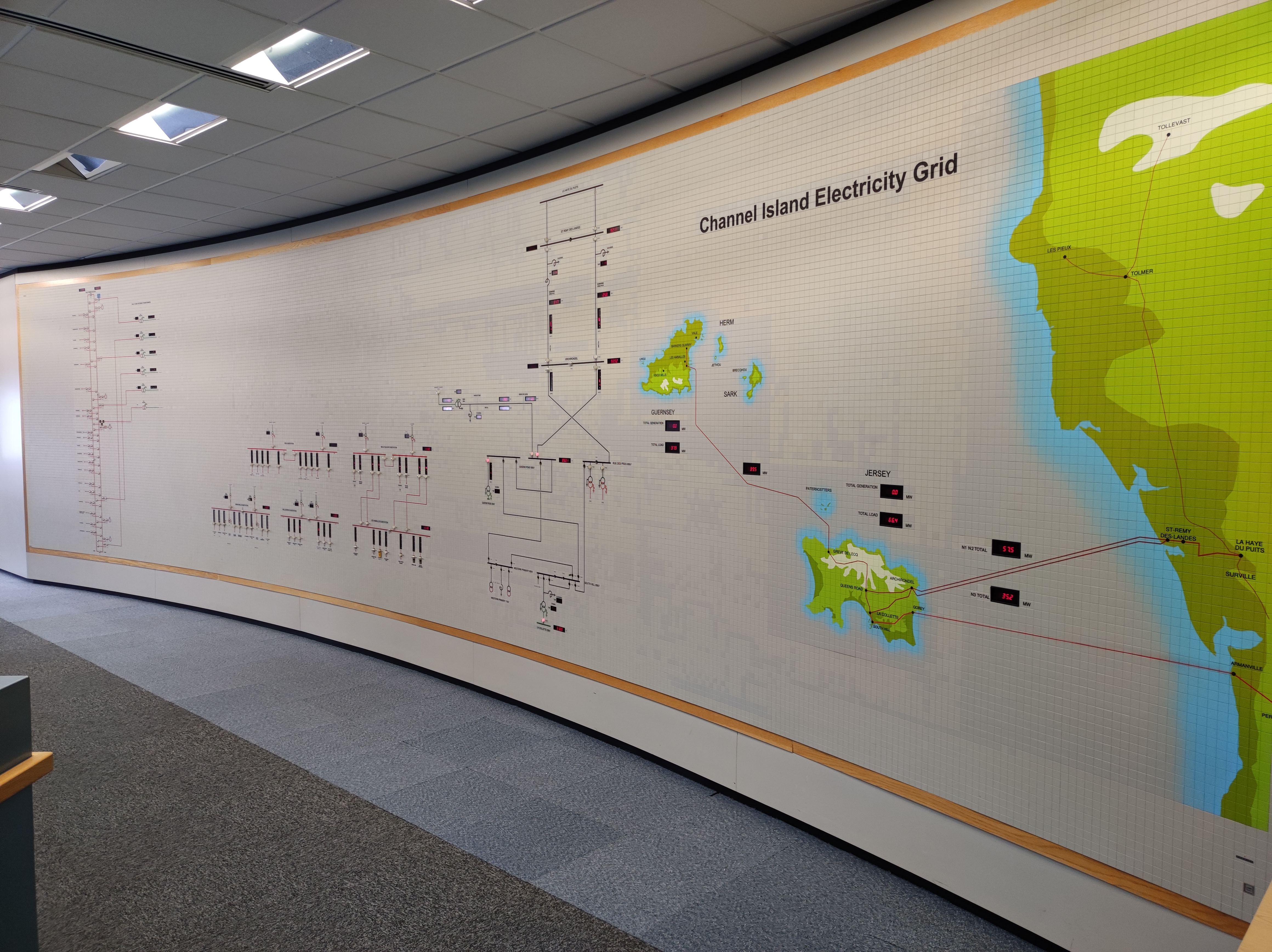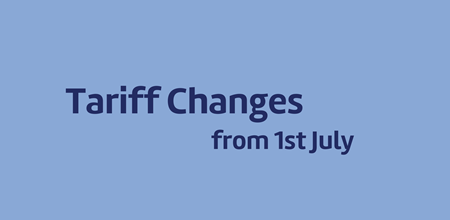Heat your home on the cleanest, cheapest tariff
To help support the transition to more sustainable heating, we now guarantee to accept all additional load applications for Off-Peak Heating installations for most two, three and some four-bedroom properties on the island up to 18kW.
Like a battery, Off-Peak Heating systems bank electricity during your overnight cheap times*, and clever technology in modern storage heating systems then release this heat, when you need it.
Plus, Off-Peak heating is far better for our local environment and produces nearly 90% less in lifecycle carbon emissions compared to an electric boiler.
Please be aware this applies to new electric heating installations only.
If you already use a 'peak' electric heating system (such as an electric boiler, underfloor heating or air source heat pump), this demands power from the grid as and when you need it, meaning it is not possible to use these systems off-peak.
'Off-Peak' heating systems are different and store energy like a battery overnight, ready to use the next day.
*For customers on the Super Economy 12 Tariff
Find out more about Off-Peak heating

How much does it cost?
Installing 'Off-Peak' storage heating can be fairly pricey. They're generally more expensive to install than 'Peak Heating' systems such as electric boilers, but less costly to install than an air source heat pump.
However the long-term benefits include owning a low-carbon heating system that is cheaper to run, plus an opportunity to future-proof your property through investment in a 'dry' heating system (i.e. with no complex plumbing) that taps into contemporary energy storage technology.
- Peak Heating systems use the Superheat Tariff plus a secondary meter standing charge.
- Off-Peak Heating use the 'Low-Rate' times on your Super Economy 12 Tariff plus in most cases, no additional standing charge.
What are Standing Charges?
Another way to visualise a standing charge is as a subscription to the entire electricity network, charged on a quarterly basis.
Off-Peak heating is a way to make your standing charge go further.
- Primary meter standing charge - light, power and 'Off-Peak' heating
- Secondary meter* standing charge - 'Peak' electric heating
Standing charges are a 'fixed fee' that all customers pay to be connected to Guernsey's electricity network to make sure there is a predictable income supporting the maintenance and improvement of the entire electricity infrastructure on the island.
*Please note if you have a second meter for lighting and power, you will also be charged a 'secondary meter' standing charge
Want to find out more? Make an enquiry
What do we mean by Off-Peak?
We want to reduce our peak demand. When it comes to electricity..
'Peak' means when people use electricity most
'Off-Peak' is when people use less electricity
If you've ever travelled by train, you'll know there is a difference between Peak and Off-Peak travel based on how busy it is. The operators encourage commuters to travel at less busy times to help manage their own demand curves and reduce business costs during peak periods.
The exact same principle works here with heating.
We'd like as many people as possible to consider installing an Off-Peak Heating system because this helps us manage Guernsey's electricity demand better and less on-island resources are needed to produce the electricity.
What does Off-Peak Heating mean for you?
Store electricity overnight for the next day's heating to win in two important areas.
Cost: Bank your heat energy during your low-rate, overnight time bands*
Carbon: Heat your home using lower-carbon electricity, particularly between 11pm and 5am - see the graph below.
Plus, we guarantee to accept your additional load application for Off-Peak Heating solutions when your load demand is up to 18kW and can be controlled by Guernsey Electricity using a meter signal.
Modern Off-Peak Storage Heating systems work in the same way as other ‘dry’ central heating systems (i.e. those without boilers), and aren’t the hard-to-use, clunky appliances they used to be. This means they’re much more user-friendly and a great way to enjoy the benefits of running low cost, low carbon home heating.
*For customers on the Super Economy 12 Tariff
Below demonstrates how electric boilers draw power from the system during 'Peak' times vs 'Off-Peak' heating that stores power overnight. This is why systems that draw power in real-time during peak hours are called 'Peak Heating' systems and are more expensive to run.
![]()
Current Prices
As of 1 July 2024. Please see our tariffs pages for the latest information.
- Most 'Peak' heating systems use the Superheat Tariff at 12.24p per unit, plus £11.41 per quarter ‘secondary meter’ standing charge
- 'Off-Peak' heating systems use your overnight 'Low-Rate' Tariff* at 11.40p per unit, plus in the majority of cases, there will be no additional standing charge as it runs from the ‘primary meter’
*If you are on the Super Economy 12 Tariff.
Has your electricity load application been refused?
If your application for electric heating has been refused, ask your installer to establish if your property demands less than 18kW, as we can guarantee to accept this application if it is for Off-Peak Heating with load controlled by Guernsey Electricity.
We may be able to accept load applications for over 18kW if it's for Off-Peak Heating, but we can't guarantee it.
Preparing for Off-Peak storage heating also means you’re future-proofing your property for 'dry' electric panel radiators, if in future more capacity becomes available on the electricity network. This means installing Off-Peak Heating is a worthwhile investment, either to take advantage of energy storage today, or to make a smooth transition to panel radiators in future that don't rely on a boiler and complex plumbing system.
What does controlled load mean?
In a 'controlled load' system, your property is allocated an overnight time band to charge the Off-Peak Heating system. The 'switch on, switch off' times are controlled with a signal from your Super Economy 12 electricity meter to your heating consumer unit, which means we can spread out energy demand more evenly across the island.
The net result will be a fully-charged heating system ready to use the next day, and a better network for our island.
The benefits of controlled electricity load are management of electricity demand to reduce strain on the grid during 'peak demand' times to make sure there is a balance between electricity supply and demand, enhanced grid stability, and reduced supply outages.
What does ‘load demand up to 18kW’ mean?
Once a room is warm, you will only pay for the heat you lose through the fabric of your building, such as the walls, roof and windows.
To establish how much power you’re likely to need, heating installers will perform a ‘heat loss calculation’ in your property to quantify how much electricity your property’s heating system will demand from the network.
If your installer can establish that your property will demand 18kW or less, we can guarantee acceptance of your heating application provided it is for Off-Peak Heating and the electricity load is controlled by Guernsey Electricity.
We’ve found that most two, three, and even some four bedroom properties demand less than 18kW, making this a realistic heating option for many households in Guernsey.
Can I reduce my property heat loss? Absolutely.
What does this mean for the electricity grid?
Those who are able to install Off-Peak Heating up to 18kW can have electric heating even in some of the most constrained areas of Guernsey’s electricity network.
As these systems demand power for 7-hours overnight, unlike electric boilers they won’t put pressure on the network during ‘peak times’ (particularly 5pm-7pm), making the process of accepting them on to the network far simpler.
Thinking of switching to electric heating?
Enquire with our team or ask your preferred installer about an Off-Peak Storage Heating system to enjoy cleaner home heating on the lowest electricity tariff.
What to do next
Whether you need to switch soon or sometime in the future, speak to our team or your preferred electric heating installer and ask them to explore your options for an Off-Peak Heating System.
They will first need to establish that your property’s electricity demand is below 18kW and depending on your current heating system, there may be some additional wiring needed.
The cost to install Off-Peak heating isn't the cheapest option, so it depends on your budget. However cheaper install options such as electric boilers are 'Peak Heating' systems which are more expensive to run as they demand power during peak times - and need a secondary standing charge.
Plus, Off-Peak heating is far better for our local environment and produces nearly 90% less in lifecycle carbon emissions compared to an electric boiler.
If your property demands more than 18kW, provided the application if for Off-Peak Heating, it's still likely to be accepted on to the network, we just cannot guarantee this.
The key is Off-Peak.











